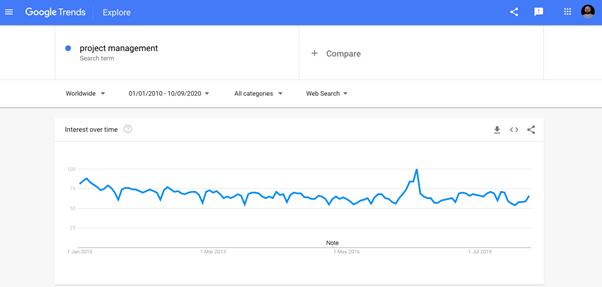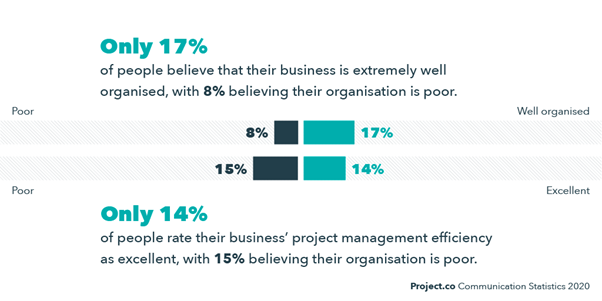What is project management? (Redefined for 2021)
Strip it down to its basics and the essence of project management has been around forever

We often think of project management as a modern concept; a ‘buzzword’ that sums up our 21st century obsession with efficiency and organization.
But, strip it down to its basics, and the essence of project management effectiveness has been around forever.
We need only look to some of the world’s oldest - and greatest - technical achievements. Take the Great Pyramid of Giza, for example. The oldest and largest of the three pyramids in the Giza pyramid complex bordering present-day Giza in Greater Cairo, it was built over 4,500 years ago - and yet remains largely intact.
- Here's our list of the best project management software out there
- We've built a list of the best collaboration tools around
- Check out our list of the best productivity software right now
This article is authored by Adam Hayes of Project.co
Popular fascination still abounds about how such an enormous structure was completed - not just built, but built to withstand the passing of thousands of years. And every imaginable explanation has been advanced - including outlandish conspiracy theories about aliens and giants, among others!
In reality, of course, the pyramids were built by people: a gargantuan undertaking in which workers (generally believed to be Egyptian farmers unable to tend their land due to adverse weather) would have needed to communicate seamlessly, set deadlines and manage their workloads with razor-sharp organization.
Bosses would have needed to identify bottlenecks and resourcing to ensure things continued apace without delays. Materials would need to be ready at the right time for the right people to put them in the right place. And every person would have to own their own part of that process.
They almost certainly wouldn’t have talked about project management. But then, as now, the same principles guided the success of the whole endeavour.
Are you a pro? Subscribe to our newsletter
Sign up to the TechRadar Pro newsletter to get all the top news, opinion, features and guidance your business needs to succeed!
And when you strip everything down to its bare bones, the same core principles essentially govern the success (or failure) of every project, before, since - and in the future.

What is project management?
So, what is project management? It’s become a surprisingly difficult question to answer, as so much unnecessary complexity has been added over the years.
In truth, project management has become an incredibly broad term with a lot of sterile, meaningless ‘management-speak’ littered definitions. It seems to have its own language, with lots of words - but not much meaning.
Taking things back to basics, the dictionary defines "project" as "an individual or collaborative enterprise that is carefully planned to achieve a particular aim", while "management" is defined as "the process of dealing with or controlling things or people".
Putting those together, we could perhaps define project management as the process of dealing with or controlling things or people, involved in an individual or collaborative enterprise that is carefully planned to achieve a particular aim.
Or, to simplify further, to give us the clearest possible understanding of what project management is: ‘Managing teams and individuals to help them achieve a set goal.’
But, going further, I’d suggest that ‘project management’ is - as well as all the above - a methodology of dealing with your projects that seriously makes the difference between success and failure.
Whether you’re creating a video, building a website, running a marketing campaign - or, indeed, building a 139-metre tall pyramid to house the remains of a dead pharaoh! - project management is about a very small, simple, but incredibly powerful, handful of ideas that keep things organised, on-track and maximise chances of success.
Those simple ideas are:
- Communication of important information
- Organization of people and teams' workloads, capacity and resourcing
- Time and task management
- Continuous evaluation of progress, combined with...
- Agility and ability to change direction along the way
In other words project management is about answering simple questions, and then ensuring all three are executed. What? When? And how?
How is project management changing in 2021?
So, as we’ve established, project management isn’t a particularly new term, and indeed it’s been a highly regarded career choice - and industry in its own right - for many years.
A quick look on Google Trends reveals that interest in the topic has been consistently high over the past decade.

Typically project management has dealt with the delivery of ‘big’ projects - particularly construction and software - where individuals and teams are employed specifically to ‘project manage.’ And that’s no surprise, when huge numbers of people, huge sums of money and huge time pressures are in play.
But increasingly, these days, similar methodologies and techniques are being adopted to manage much smaller projects. Again - we’re seeing that an additional focus on project management is required across industries, products and services.
But why would this be the case now, in the 2020s? You’d think that, more than ever, projects would essentially manage themselves - with all the technology and advantages we’ve amassed in recent years?
Counterintuitively, in many ways, the emergence of technology is exactly what’s created such a minefield for businesses. With more software tools available for people to communicate and manage their work, comes more choice. With more choice, comes less uniformity. And with less uniformity comes inconsistency and disorganisation.
The stats back this up. Studies suggest that an almost unanimous 96% of people think the businesses they deal with could improve when it comes to communication and project management, while only 17% of people believe that their business is extremely well organised - and 8% say it’s ‘poor.’

Drilling down to the specific, individual experiences, nearly three-quarters of people have struggled to find project files that have been shared privately with other people, while 63% of people have missed a message or important piece of information that went into a colleague's inbox while that colleague was absent.
Set against the backdrop of sky-high customer expectations - where customers expect a seamless, connected experience - businesses are under immense pressure and often failing to deliver.
Throw in a healthy dose of remote working - already a rising trend but compounded by the global pandemic of 2020 - and businesses are really struggling to achieve the goal of scalable, repeatable success across people, teams and projects.
Project management, then - a redefined and simplified version - desperately needs to emerge as the antidote to this modern chaos: a ‘correction of course’ from individual ways of working to something more universal and efficient across organisations.
It’s about taking projects from the beginning, being laser-focused on the goals and requirements of the project. It’s about breaking down those requirements into the individual steps that need to be taken, and when - allocating those tasks to people, ensuring they’re completed on time, and reacting ASAP if things start to slip. And it’s about managing that process through to the end, with quality control throughout.
5 steps to effective project management
So, with all that said, project management in 2021 can be boiled down to 5 essential steps - best practices to aim for, which - if followed correctly - all but guarantee successful execution of pretty much any project, big or small.
1). Goal setting
The best projects are clearly defined from the very beginning - like setting a destination on a GPS system. It’s a state of defining where you start from, and where you need to get to, by when. The clearer you can make this vision from the beginning, through specifications, briefing documentation, visualisation and more - the better.
2). Systemizing processes
We talk a lot about repeatability in business, and essentially this starts with breaking down the whole project into the ‘steps’ that will be required.
For example, if you’re making a marketing video, you’d need to write a script; create the graphics; animate or film the video; add music, and voiceover. Each one of these would be a process to be systemised, with its own repeatable elements, so that it can be carried out time after time.
Creating a clear blueprint for how your projects work is a great step that adds enormous value to your business. Clearly, no two projects are exactly the same but if you have clearly defined ‘phases’ of your process, you can map this out and simply change your timescales around.
Systemizing in this way gives managers and leaders a clear overview of where things are up to and helps them forecast workload, identify resourcing issues and bottlenecks so they can adjust along the way.
3). Communication
It may be number 3 on the list, but it’s perhaps the most important. Communication of important info - both with clients, and within your team internally - is non-negotiable for effective project management.
There are real problems (some of which I mentioned earlier) with siloed information that isn’t shared centrally. Many people choose to use email as their communication tool of choice, which has its advantages - but so much information slips through the cracks and is inaccessible to people working on a project.
If possible, communication should be out in the open - messages should be available to be reviewed throughout the project by anyone who might need to see them.
This makes it really important to use one consistent set of tools, ensuring all communication has a consistent location and can be found easily.
4). Transparency
Another crucial factor is visibility. If everybody knows what everybody else is doing, it enhances their own understanding of their own role and builds strong connections and understanding throughout your team. This helps build a sense of purpose and connection which is invaluable.
5). Software
Again, it’s 2021 and that means there are so many choices available, for communication, for task management, for to-do lists, for file sharing, for time tracking and everything in between. Everyone will have their own preferences - but it’s important to try and limit that choice, and make sure that a) there are clearly defined tools for working on a project, and b) there’s a strong collective buy-in to using that tool across your team.
- Here's our list of the best video conferencing services around